|
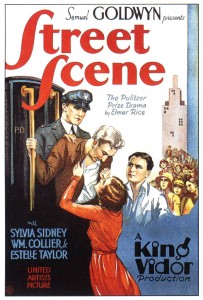
Synopsis:
An unhappy housewife (Estelle Taylor) has an affair with a local milk collection man (Russell Hopton), while her neighbors — including nosy Mrs. Jones (Beulah Bondi), whose grown son (Matt McHugh) is a bullying racist — worry Taylor’s husband (David Landau) will find out and become abusive. Meanwhile, Taylor’s daughter (Sylvia Sidney) resists advances from her boss (Walter Miller) while pinning her hopes for happiness on a studious neighbor (William Collier, Jr.).
|
|
Genres, Themes, Actors, and Directors:
- Beulah Bondi Films
- John Qualen Films
- King Vidor Films
- Marital Problems
- New York City
- Play Adaptations
- Sylvia Sidney Films
Response to Peary’s Review:
Peary points out that this adaptation of “Elmer Rice’s… Pulitzer-winning play about life in the New York tenements” was “one of the first social dramas of the sound era”, “probably the first film to drive home the point that America was populated by foreigners, and the first to affirm that there were already clashes between these immigrants over religion, national origin, and politics”. He notes that “to give [the] film some visual interest, Vidor occasionally uses bizarre camera angles or pans along the street or across a row of windows”; indeed, while the movie’s stage origins are crystal-clear (including an obvious “Act II” transition), Vidor nicely opens up a storyline that is primarily centered on “characters gather[ing] on the front stoop or lean[ing] out windows so they can gossip, complain[ing] about the heat, [and] argu[ing]”.
The inherent claustrophobia of the stage-bound setting actually serves this story well, as it highlights how closely connected these neighbors are to each others’ business, for better and for worse. They can support one another during times of need — as when Taylor looks out for the very-pregnant wife of a concerned father-to-be (Conway Washburne) — but also easily become overly involved in each other’s private lives and choices. The film’s Pre-Code sensibility is refreshingly clear, most noticeably via intermittent scenes involving a bra-less young woman (Greta Granstedt) who happily goes off with her lover to spend the night in a friend’s apartment, but also in the shockingly racist language used by McHugh, and the fact that Collier, Jr.’s father (Max Montor) is able to talk at length about socialist revolutionary ideals without being overtly villainized. The dramatic finale (don’t read ANY online reviews if you want to remain surprised!) has been ridiculed by some for Vidor’s unconventional editing choices during a key neighborhood scene, but I believe it’s an effectively stylized representation of life in a densely packed, multicultural city.
Redeeming Qualities and Moments:
- Vidor’s direction
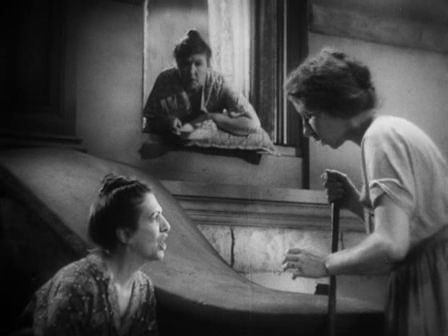
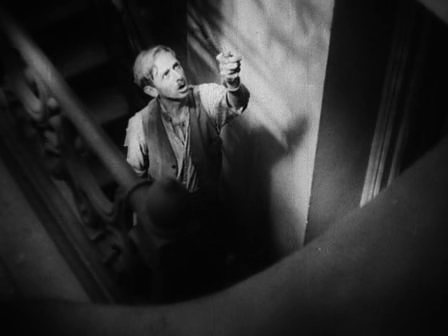
- A refreshing Pre-Code sensibility
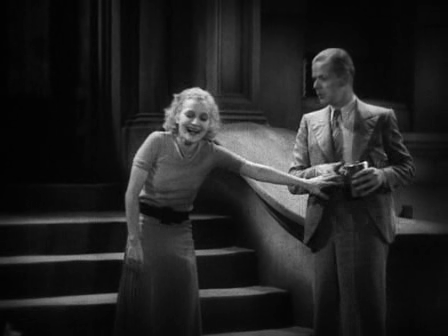
- A fine sense of locale
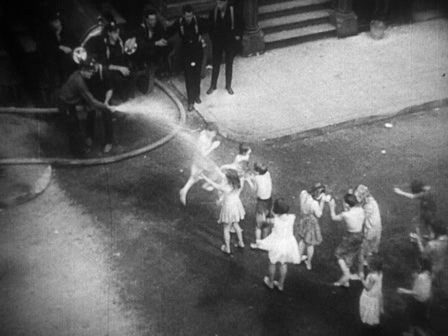
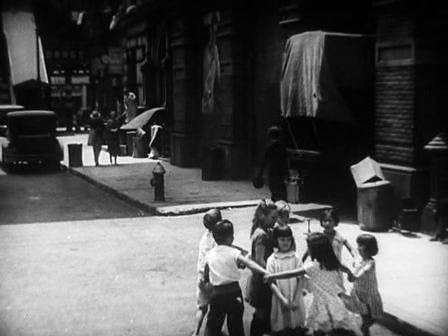
Must See?
Yes, as a strong Pre-Code talkie.
Categories
Links:
|






One thought on “Street Scene (1931)”
First viewing.
A once-must, for its place in cinema history, and for reasons brought out in the assessment (which I overall agree with).
A man with one of the longest Hollywood histories as a director, Vidor made some particularly interesting films in the earlier part of his career (i.e., ‘The Big Parade’, ‘The Crowd’, ‘Hallelujah’, etc.). He once said, “A simple story filmed with limited sets can often be more effective than a costly extravaganza. provided it has depth, and allows the audience to identify with the character.”
‘Street Scene’ is such a film; its few flourishes aside, it is simplicity itself. Rice’s play is one of hundreds of plays I read in college, but I’d never seen a production. It’s probably not the kind of play that would lend itself well to a revival. Yet, at the same time, it remains strangely relevant – reminding us that the more things change, the more they basically remain the same. Bigots are still bigots and gossips are still gossips. Inter-communication and ‘live and let live’ still often elude us. And people still long – more than anything – for supportive, fulfilling personal relationships. It is all the street of life.